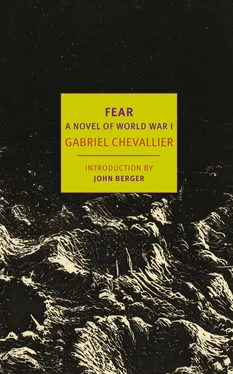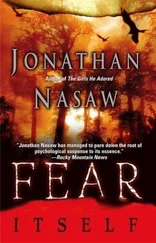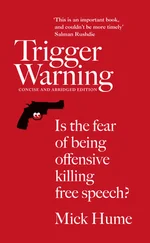In Brussels, in London, in Rome, those who feel threatened assess the balance of forces, weigh up their chances, and choose their camp.
And millions of men, because they believed what they were taught by emperors, legislators and bishops in their legal codes, their manuals of instruction and their catechisms, by historians in their history books, by ministers on their platforms, teachers in their colleges, and decent, ordinary people in their living rooms, these millions of men form countless flocks that shepherds with officers’ braids lead to the slaughterhouses, to the sound of music.
In a few short days, civilisation was wiped out. In a few short days, all our leaders became abject failures. For their role, their only role that mattered, was precisely to prevent all this.
If we did not know where we were going, they, at the very least, should have known where they were leading their nations. A man has the right to be stupid on his own account, but not on behalf of others.
On the afternoon of 3 August, I take a walk through the city with Fontan, a friend the same age as me.
Outside a café in the centre, an orchestra is blasting out the Marseillaise . Everyone removes their hats and stands up to listen. Everyone, that is, except for one frail, humbly dressed little man with a sad face crowned by a straw hat, who sits alone in a corner. One of the bystanders spots him, rushes up and, with a flick of his hand, knocks his hat flying. The man goes pale, shrugs his shoulders and says ‘Bravo! Brave citizen!’ The other man orders him to stand up. He refuses. Other people come over, surrounding him. The aggressor continues: ‘You are insulting the nation, I will not put up with it!’ The little man, by now very pale but stubborn, replies: ‘And you, in my opinion, are insulting reason but I’ll say nothing. I am a free man and I won’t celebrate war.’ Someone shouts: ‘Give the coward a damn good hiding!’ People run up from behind him, walking sticks are raised, tables overturned, glasses broken. In no time at all, a mob has formed. Those at the back, who haven’t seen anything, tell newcomers what is happening. ‘He’s a spy. He shouted “Long live Germany!”’ Indignation grips the mob, drives them on. There is the sound of blows striking home, cries of hatred and of pain. Eventually the café manager scurries over, a napkin still draped over his arm, and pulls them off. The little man, knocked off his chair, lies on the floor among the spit and cigarette ends. His badly bruised face is unrecognisable, with one eye closed and blackened; blood trickles from his forehead and his open, swollen mouth; he is breathing with difficulty and cannot get up. The manager calls two waiters: ‘Get him out of here!’ They drag him on to the pavement and leave him there. But then one of the waiters goes back, leans over and shakes him threateningly: ‘And what about your bill?’ As the unfortunate man doesn’t answer, the waiter rifles through his pockets and pulls a fistful of coins from his waistcoat, taking what he considers the right amount with the mob as his witness. ‘The bastard would have gone off without paying!’ General approval — ‘These people are capable of anything! Lucky he was disarmed! He had a gun? He threatened people with a revolver. We’re always too nice in France! The socialists are playing Germany’s game, no mercy for those wretches. We’re not having a repeat of 1870 this time round.’
To mark this great victory, people demand an encore of the Marseillaise . They stand and listen, looking down at the little man who is bleeding and whimpering quietly. Beside me I notice a beautiful, pale woman who murmurs to her companion: ‘What a dreadful sight. That poor man had the courage…’ ‘… of an idiot,’ he interrupts. ‘It is folly to go against public opinion.’
‘There we see the war’s first casualty,’ I say to Fontan.
‘Indeed,’ he says, absently, ‘there’s a great deal of enthusiasm.’
I am the silent witness of this great frenzy.
From one day to the next, civilians dwindle away, transforming themselves into hastily dressed soldiers who run around town to make the most of their last hours and get themselves admired, and no longer button up their army tunics because this is war. In the evenings, those who have drunk too much insult passers-by, whom they take for Germans. The passers-by see this as a good sign and applaud them.
Wherever you go you hear martial music. Old gentlemen wish they were young, children bitterly wish they were not, and women bemoan the fact that they are only women.
I lose myself in the crowds which fill the approaches to the barracks, these sordid barracks that have become the storage batteries of national energy. I watch the regiments leave for the front. The crowd surrounds them, hugs them, showers them with flowers, and gets them drunk. Every line of soldiers is accompanied by clusters of delirious, dishevelled women, who are crying and laughing, offering their waists and their breasts to these heroes as if to the nation; who kiss the sweating faces of the rough, honest warriors and scream their hatred for the enemy, which makes them look ugly.
I watch the cavalry trot by, the army’s aristocracy. The heavy cuirassiers, their breastplates blinding in the sunshine, an unstoppable force in a headlong charge. The dragoons, like medieval jousters preparing for a tournament with their plumed helmets, lances and pennants. The mounted chasseurs of the light cavalry, capering and prancing in their pale blue uniforms, chasseurs of the forward posts, who surge out of a fold in the landscape to cut down an enemy detachment with their sabres, or capture a village in a surprise attack. The artillery makes the houses shake; they say that the 75s fire twenty-five rounds a minute and always hit the target by the third shell. People gaze with respect at the silent muzzles of these little monsters that in a few days’ time will be tearing whole divisions to shreds.
The Zouaves and the colonials are especially popular: bronzed, tattooed and fierce, straight-backed despite their huge packs, with wide, godless grins. People think they are bandits who will give no quarter; this is reassuring. And here come the blacks, whom we can spot from a distance by the white teeth shining in their dark faces, these childlike and cruel blacks who decapitate their enemies and cut off their ears to make amulets. A charming little detail. Good old blacks! People offer them alcohol and affection, relish the strong scent, that exotic scent they associate with the Colonial Exhibition, that lingers in the air as they pass. The blacks are happy, happy suddenly to merit the friendship of white men, and because they think the war will be like one of those wild dances they have in their own countries.
Railway stations are now closed to the public. Their surroundings look like military encampments, with stacks of rifles everywhere, and crowds of troops waiting their turn to be swallowed up by the trains alongside the platforms. The stations are the hearts through which the nation’s blood is flowing, pumped out along the arteries, the tracks, to the North and the East, where men in their madder-dyed breeches multiply like red corpuscles. ‘Destination Berlin’ is chalked on the carriages. The trains set off for adventure, filling the countryside with a clamour that is more joyful than bellicose. At every level-crossing, people shout back to them, handkerchiefs waving. With all these overexcited, empty-headed passengers, you would think these were holiday trains.
All across Europe, right up to the borders of Asia, armies are on the move, impatient to take on the enemy, certain of the justice of their cause and confident of victory.
Who is afraid? No one! No one yet…
Twenty million men, whom fifty million women have covered in flowers and kisses, hasten towards glory, bellowing out their national anthems.
Читать дальше












